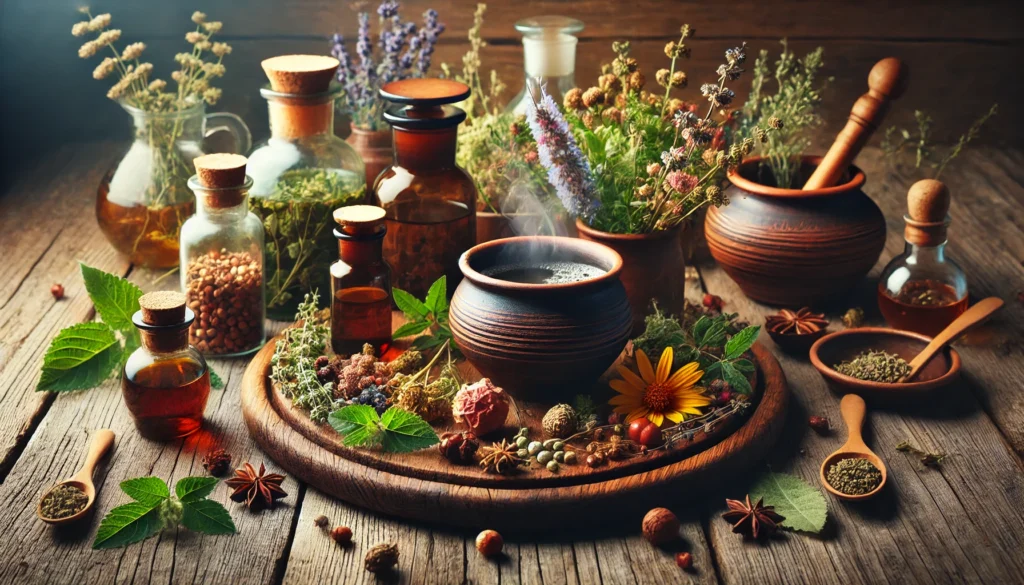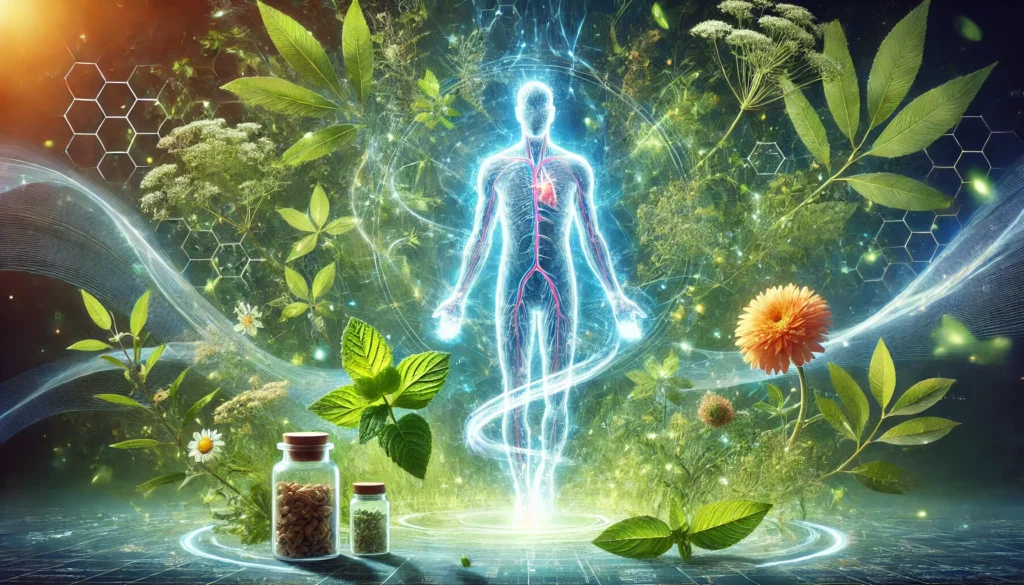Introduction: The Rising Influence of Botanical Medicine in Modern Healthcare
The increasing reliance on botanical medicine underscores a growing awareness of the power of natural healing remedies. For centuries, traditional cultures have utilized plant medicines to treat ailments and promote well-being. With the resurgence of interest in holistic remedies, modern science has begun to explore the bioavailability of nutrients in herbal products, leading to a better understanding of their therapeutic potential. As more individuals seek natural treatment options over synthetic pharmaceuticals, the role of bioavailable nutrients in herbal remedies has become a focal point of research. The effectiveness of natural herbs hinges on their ability to be absorbed efficiently by the body, ensuring optimal benefits from plant-derived compounds. This article delves into the intersection of botanical medicine and bioavailable nutrients, highlighting their profound impact on holistic health and wellness.
You may also like: What Supplements Should I Take? The Best Bioavailable Nutrients for Natural Energy and Vitality
The Foundations of Botanical Medicine and Herbal Remedies
Botanical medicine, also known as herbal medicine, encompasses the use of plant-based substances to prevent and treat health conditions. The practice dates back thousands of years and is deeply embedded in the traditions of Chinese medicine, Ayurveda, and Western herbalism. While conventional medicine often isolates active compounds for pharmaceutical use, herbal remedies embrace the synergistic properties of whole plants. This holistic approach ensures a broad spectrum of beneficial compounds working together to enhance therapeutic efficacy. A crucial component of botanical medicine is its emphasis on bioavailability—the extent to which nutrients and active compounds can be absorbed and utilized by the body. The effectiveness of natural healing remedies is directly linked to the body’s ability to assimilate the medicinal constituents found in herbs and remedies. Researchers continue to investigate how herbal products can be formulated to maximize bioavailability and enhance their medicinal value.

Understanding Bioavailable Nutrients in Herbal Medicine
Bioavailability plays a pivotal role in determining the therapeutic potential of herbal meds. When individuals consume plant medicines, the active compounds must be efficiently absorbed into the bloodstream to exert their effects. Factors such as plant species, preparation methods, and individual metabolism influence the bioavailability of natural herbs. Traditional herbalists and modern scientists alike focus on improving absorption through various techniques, including fermentation, extraction, and combination with bioenhancers. For instance, turmeric’s active compound, curcumin, has low bioavailability when taken alone but significantly increases when combined with black pepper extract, known as piperine. Similarly, the bioavailability of fat-soluble vitamins in herbal products is enhanced when taken with healthy fats, ensuring optimal absorption and utilization by the body.
The Role of Holistic Remedies in Enhancing Absorption
Holistic remedies prioritize the body’s natural ability to process and utilize plant-based nutrients efficiently. Many herbal doctors emphasize the importance of consuming whole foods and herbal preparations that retain their full spectrum of beneficial compounds. The synergy of natural compounds in botanical medicine contributes to enhanced bioavailability and therapeutic outcomes. For example, herbal treatments such as decoctions, infusions, and tinctures optimize the delivery of active ingredients. Fermented herbal products have also gained popularity due to their improved bioavailability, as fermentation breaks down complex compounds into more readily absorbable forms. Understanding what is herbal treatment from a bioavailability perspective enables practitioners and consumers alike to make informed decisions regarding the most effective methods of herbal supplementation.
Synergistic Combinations of Herbs and Remedies
One of the fundamental principles of herbal medicine is the strategic combination of herbs to enhance their efficacy. In many traditional medical systems, herbs are carefully blended to create synergistic effects that improve absorption and overall effectiveness. Adaptogenic herbs, such as ashwagandha and rhodiola, are often combined with other bioenhancing herbs to amplify their stress-reducing and immune-boosting properties. Similarly, herbal remedies designed to support digestion frequently include bitter herbs, such as dandelion and gentian, which stimulate digestive enzyme production and improve nutrient assimilation. The ability to combine herbal products effectively is a key component of herbalism, reflecting a deep understanding of plant medicines and their interactions with human physiology.
The Future of Botanical Medicine: Innovations in Bioavailability
As interest in natural healing remedies continues to grow, researchers are developing innovative ways to enhance the bioavailability of herbal meds. Liposomal formulations, which encapsulate plant extracts in lipid-based carriers, significantly improve absorption by protecting active compounds from degradation in the digestive system. Nanotechnology is another promising avenue, allowing herbal products to be delivered in ultra-small particles that enhance their uptake at the cellular level. These advancements represent the future of herbal medicine, bridging traditional wisdom with modern science to create highly effective natural treatments. Consumers seeking holistic remedies can benefit from these innovations, ensuring they receive the maximum therapeutic effects from plant medicines.

Frequently Asked Questions (FAQ) on Herbal Remedies and Natural Healing
1. What is herbalism and how does it benefit overall health?
Herbalism is the practice of using natural herbs and plant medicines to promote healing and well-being. It has been used for centuries across different cultures as a natural treatment for various ailments. Unlike pharmaceutical drugs, herbal remedies often focus on addressing the root cause of an issue rather than just treating symptoms. The holistic approach of herbal medicine considers the body, mind, and spirit, aiming to restore balance through botanical medicine. With the increasing demand for natural healing remedies, herbalism continues to evolve, incorporating modern research with traditional wisdom.
2. What is a herbalist and what role do they play in natural treatment?
A herbalist is a trained practitioner who specializes in using herbal medicine to support health and wellness. They assess an individual’s health concerns and recommend appropriate herbal remedies based on their knowledge of natural herbs and botanical medicine. Unlike conventional doctors, a herbal doctor takes a holistic approach, considering diet, lifestyle, and emotional well-being in treatment plans. Many herbalists also create custom formulations using plant medicines tailored to an individual’s needs. Consulting a herbalist can be beneficial for those seeking alternatives to pharmaceutical medications or those looking to incorporate herbal products into their wellness routine.
3. How do herbal remedies compare to pharmaceutical drugs?
Herbal remedies are often seen as a gentler and more holistic alternative to pharmaceutical drugs. While pharmaceutical medications typically target specific symptoms, herbal medicine aims to treat the whole person, supporting the body’s natural ability to heal. Botanical medicine generally has fewer side effects compared to synthetic drugs, although it is essential to use herbal meds under proper guidance. Additionally, herbs and remedies often work synergistically, providing long-term benefits rather than just temporary relief. Understanding the differences between herbal treatment and conventional medicine can help individuals make informed healthcare choices.
4. What are some of the best herbal products for boosting immunity?
Certain herbal products are known for their immune-boosting properties, making them valuable for maintaining health. Echinacea, for example, is widely used to strengthen the immune system and reduce the severity of colds. Elderberry is another powerful natural herb that has antiviral properties and is often taken during flu season. Astragalus is commonly used in herbal medicine to enhance the body’s resistance to infections. A well-rounded list of herbal supplements for immunity includes adaptogenic herbs like ashwagandha and reishi mushroom, which help the body adapt to stress and maintain overall well-being.
5. Which supplement burns fat and increases metabolism naturally?
Some herbal remedies have been traditionally used as natural metabolism boosters and fat burners. Green tea extract contains catechins, which help enhance fat oxidation and metabolic rate. Cayenne pepper, rich in capsaicin, has thermogenic properties that increase calorie burning. Garcinia cambogia is often included in herbal medicine for its ability to suppress appetite and support weight management. Adaptogens like rhodiola and ginseng can help balance energy levels and improve endurance, making them excellent natural treatment options for metabolism support. When combined with a healthy diet and exercise, these herbal meds can aid in natural weight management.
6. How do holistic remedies support mental health and stress relief?
Holistic remedies focus on the mind-body connection, using natural herbs to promote relaxation and emotional balance. Lavender, for example, is widely used in herbal medicine for its calming effects and ability to ease anxiety. Ashwagandha is an adaptogenic herb that helps regulate cortisol levels, reducing stress and fatigue. Passionflower is often used as a natural treatment for insomnia and restlessness. Herbal products containing chamomile or valerian root can also aid in relaxation and sleep quality. Combining these botanical medicine practices with mindfulness and self-care strategies enhances their effectiveness in supporting mental well-being.
7. What natural healing remedies are effective for digestion and gut health?
Herbs and remedies have been used for centuries to promote digestive health and alleviate gastrointestinal discomfort. Peppermint is known for its ability to relieve bloating and support digestion. Ginger is a powerful natural treatment for nausea and indigestion, commonly used in herbal medicine. Licorice root has soothing properties that help with acid reflux and gut inflammation. Probiotic-rich herbal products like kombucha and fermented herbs aid in balancing gut flora for improved digestion. A well-curated list of herbal supplements for gut health includes digestive enzymes, bitters, and soothing herbs like slippery elm.
8. What is herbal treatment and how can it be used for chronic conditions?
Herbal treatment refers to the use of plant medicines to manage and prevent chronic health conditions naturally. Many herbal meds, such as turmeric, have anti-inflammatory properties that can help manage arthritis and joint pain. Hawthorn berry is widely used in herbal medicine to support cardiovascular health and regulate blood pressure. Milk thistle is known for its liver-supporting benefits, making it useful for detoxification. Herbalists often develop personalized natural treatment plans that incorporate various herbs to address specific health concerns holistically. Regular use of botanical medicine may contribute to long-term wellness and disease prevention.
9. What are some must-have herbal supplements for overall well-being?
A well-rounded list of herbal supplements includes adaptogens, immune boosters, and digestive support herbs. Ashwagandha and rhodiola are excellent for managing stress and enhancing resilience. Spirulina and chlorella provide a rich source of nutrients and detoxifying properties. Herbal products like nettle leaf and dandelion root support kidney and liver health. Whether one is seeking natural energy, immunity, or digestive support, selecting the best herbal remedies tailored to individual needs can be highly beneficial.
10. How do herbal doctors integrate plant medicines into modern healthcare?
Herbal doctors blend traditional wisdom with modern science to provide comprehensive health solutions. They often collaborate with medical professionals to complement conventional treatments with herbal medicine. Many herbal doctors conduct research on botanical medicine to validate the efficacy of plant-based treatments. They also educate patients on herbs and remedies that align with their specific health concerns. As interest in natural treatment continues to grow, herbal doctors play a vital role in bridging the gap between traditional and modern medicine, offering holistic solutions for various ailments.

Conclusion: Embracing the Power of Herbal Medicine and Bioavailable Nutrients
The integration of bioavailable nutrients into botanical medicine represents a significant step forward in holistic healthcare. By understanding what is herbalism and the importance of bioavailability, individuals can make informed choices about the herbal products they use. The future of herbal treatment lies in optimizing the absorption of medicinal compounds, ensuring that natural herbs continue to serve as powerful allies in health and healing. As the field of herbal medicine evolves, embracing both traditional knowledge and scientific advancements will pave the way for more effective and accessible herbal remedies. Whether through strategic herb combinations, innovative formulations, or improved preparation methods, the journey toward maximizing the benefits of botanical medicine is an ongoing endeavor that holds immense promise for natural healing and wellness.
botanical extracts, holistic health supplements, plant-based healing, herbal absorption, natural medicine bioavailability, traditional herbal practices, bioavailable herbal compounds, herbal formulations, plant-derived nutrients, medicinal herbs efficacy, herbal remedy enhancement, therapeutic herbal solutions, natural wellness, advanced herbal treatments, bioenhanced herbal supplements, alternative medicine innovations, holistic healing advancements, plant-based therapeutics, integrative herbalism, herbal synergy in medicine
Further Reading:
Disclaimer
The information contained in this article is provided for general informational purposes only and is not intended to serve as medical, legal, or professional advice. While NewsHealthWatch strives to present accurate, up-to-date, and reliable content, no warranty or guarantee, expressed or implied, is made regarding the completeness, accuracy, or adequacy of the information provided. Readers are strongly advised to seek the guidance of a qualified healthcare provider or other relevant professionals before acting on any information contained in this article. NewsHealthWatch, its authors, editors, and contributors expressly disclaim any liability for any damages, losses, or consequences arising directly or indirectly from the use, interpretation, or reliance on any information presented herein. The views and opinions

